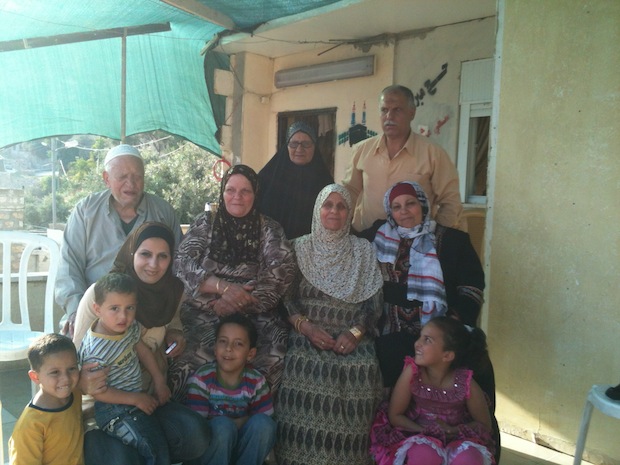The Jewish National Fund, known to Jews worldwide as an organization that plants trees in Israel, is once again trying to evict a Palestinian family from their home in East Jerusalem.
By Moriel Rothman-Zecher

Over the past few decades, the Jewish National Fund (JNF-KKL), an organization known to many in the diaspora for its work planting trees in Israel (I gave a portion of my Bar Mitzvah money to the JNF), has been working in coordination with Elad, an extremist settler organization whose explicit goals include the “Judaization” of East Jerusalem. Since 1991, the cooperation between these two organizations has led to eviction of a number of Palestinian families from their homes in the East Jerusalem neighborhood of Silwan. While ELAD’s methods of takeover in Silwan have included shady sales agreements and forceful confiscation in the middle of the night, they are also often done in complete accordance with Israeli law. This fact is often cited as a defense by the JNF and its supporters. In a 2012 op-ed, JNF CEO Russell Robinson wrote:
“JNF respects the legal processes of the democratic State of Israel. Asking us to make a declaration against any evictions — of Arabs or Jews — is beyond our mission. The money we raise is used only for the purpose of making Israel a better place. Everything about us is ‘neutral’…”
I’ll let the reader meditate on this quote, and the irony of the JNF’s —and the broader Diaspora Jewish establishment’s — admiration for the legacy of the Civil Rights movement in the United States. Even one of their forests in the Galilee is the Corretta Scott King Forest. The Civil Rights Movement was predicated on the violation of unjust ‘’democratic’’ laws. Robinson also writes that ‘’Those who use the term ‘judaizing’ insult the men and women who perished fighting for our democratic Jewish State of Israel.” I wonder if he realizes what he is saying about the administrators of the City of David, backed by virtually all levels of the Israeli politically establishment.
In the fall of 2011, the JNF-KKL’s role in facilitating the eviction of Palestinian families from their homes in Silwan was spotlighted by a campaign to prevent the eviction of the Sumarin family from their home, directly next to ELAD’s City of David tourist site. The JNF-KKL’s claim to the property was based on the Absentee Property Law, a law that allows the Israeli government to take over properties abandoned by Palestinians during the 1948 war, and which applied solely to Palestinians.
In response to the JNF-KKL’s plans, an international campaign was launched by Rabbis for Human Rights, its partner organization in the U.S., Truah (then RHR-NA), Palestinian activists from the Wadi Hilweh Information Center and others. The campaign resulted first in the JNF’s U.S. branch attempting to claim that it was not involved in the case. But when faced with documents proving otherwise, it agreed to temporarily delay the eviction. Meanwhile, Seth Morrison, a board member of the JNF in the U.S., resigned in protest. The eviction process against the Sumarin family remains frozen to this day.

A few months later, in February of 2012, came another JNF-KKL and ELAD-backed eviction case. This time it was the Ruweidi family who was being threatened. The Wadi Hilweh Information Center published a letter to the JNF-KKL by Juma’a Muhammad Saalim al-Ruweidi, the 85-year-old owner of the house, asking them not to evict his family. In the letter, Ruweidi described the bizarre circumstances of their case, including a falsified declaration of “absentee property” signed by a Palestinian man with no connection to the family or the neighborhood:
“His claim was that the house was owned by a man named Muhammad Saleem Darwish who died in Jordan, and not in the house. There is no one named Muhammad Saleem Darwish. The real owner of the house, my father Muhammad Saalim Darwish, was in possession of an Israeli ID-card when he died, in 1969, in this very house and not in Jordan. The reason that the false claim was approved by the courts had to do with the fact that during the Ottoman and British period, documents were written in Latin characters, and thus both “saleem” and “saalim” were spelled S-A-L-I-M. We tried to explain this to the courts and to fix this simple and strange mix up, but they did not listen to us, and our property was declared Absentee Property. They did so for a reason. Under the “Absentee Property Law,” if the Palestinian owner of a house in East Jerusalem is abroad in a country that does not have relations with Israel, the property can be declared Absentee Property. This law is unfair because it is only applied against Palestinians. In 1995, the Israeli government admitted that its use in East Jerusalem was unfair. And our case is one of an unfair law being used unfairly.”
Activists responded with a campaign of letters and protests, until May 2, 2012, when Judge Miriam Mizrahi ruled in favor of the Ruweidi family. In the time since, Juma’a al-Ruweidi passed away, but ELAD and the JNF have not forgotten about his family or his home. Their lawyers have appealed Mizrahi’s decision to the Supreme Court, which will hear the case on Thursday, March 12, at 11:30 a.m. The Ruweidi family has asked that activists and supporters attend the hearing, and call on the JNF to reconsider its role its role in turning the Ruweidi family into refugees. The JNF can still decide not to pursue the eviction, and to acknowledge the Ruweidi family’s right to live in their home in peace.
Moriel Rothman-Zecher is an American-Israel

